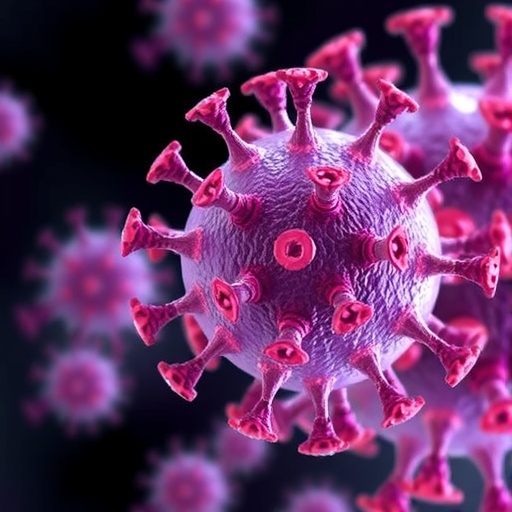In the realm of microbiology and infectious disease control, new breakthroughs often lay the foundation for future therapeutic interventions. A recent study conducted by Unlu and Uskudar Guclu has unveiled a remarkable discovery in the fight against the notorious bacterium Pseudomonas aeruginosa. This pathogen is widely recognized for its role in nosocomial infections and its notorious resistance to multiple antibiotics. Their research, which focuses on the genomic characterization of a novel bacteriophage, opens new avenues for antimicrobial therapy by introducing a member of a previously unrecognized genus—named Angoravirus.
The notable findings stem from a comprehensive genomic analysis that reveals the unique characteristics of the newly identified bacteriophage. Phages, which are viruses that specifically infect bacteria, have garnered renewed interest as potential alternatives to antibiotics, particularly as antibiotic resistance continues to emerge at alarmingly high rates. By examining this phage from a genomic perspective, the researchers have laid the groundwork for understanding its functionality at a molecular level, including its infection mechanisms and structural attributes that make it effective against Pseudomonas aeruginosa.
In their investigation, Unlu and Uskudar Guclu conducted a series of in vitro tests to ascertain the antimicrobial and antibiofilm properties of the new bacteriophage. Pseudomonas aeruginosa is notorious for forming biofilms, which are complex communities of microorganisms that adhere to surfaces and are encased in a protective matrix. These biofilms significantly complicate treatment protocols, rendering conventional antibiotics less effective. The discovery that Angoravirus has the capability to disrupt biofilm formation and kill bacteria within these structures positions it as a promising candidate for phage therapy.
The phage application offers a multifaceted strategy for combating bacterial infections. Unlike traditional antibiotics, which can indiscriminately kill a wide range of bacteria including beneficial flora, phages are highly specific, targeting only particular bacterial strains. This selectivity not only preserves the natural microbiome but also diminishes the chance of developing secondary infections. The unique genomic traits of Angoravirus, as outlined in the study, may bolster its ability to not only attack free-floating bacteria but also penetrate complex biofilm structures.
One of the pivotal aspects of this research resides in the phage’s genomic composition. Through meticulous bioinformatics analyses, the researchers delineated the evolutionary relationships between Angoravirus and other known phages. This analysis suggests evolutionary pathways that could be exploited for phage engineering, potentially enhancing their therapeutic efficacy. The researchers highlighted the genetic elements that confer virulence and replication advantages, a critical advantage when considering phage therapy for clinical applications.
In addition to characterizing the genomic features of Angoravirus, the study assessed its in vitro efficacy against clinical isolates of Pseudomonas aeruginosa. The testing revealed remarkable potency, achieving a significant reduction in bacterial counts. The results from this preliminary study herald the potential of Angoravirus as more than just a biological curiosity; it may soon evolve into a substantial player in the antibiotic resistance arena.
The implications of this research extend far beyond the laboratory bench. The ability of Angoravirus to effectively combat biofilms could reshape treatment paradigms for chronic infections caused by Pseudomonas aeruginosa, particularly in immunocompromised patients. The versatility of phages allows them to be used in conjunction with existing antibiotics, potentially enhancing the effectiveness of traditional therapies and leading to better patient outcomes.
As we examine the broader impacts of this study, it is essential to consider the regulatory and practical challenges that lie ahead in phage therapy development. While phage therapy is not a novel concept, its transition from bench to bedside requires navigating complex regulatory frameworks that govern therapeutic agents. The inclusion of a newly discovered genus further complicates these proceedings, as safety and efficacy must be thoroughly evaluated in clinical settings.
Moreover, public perception of phage therapy remains an area of active discourse. Many healthcare professionals and patients are unfamiliar with phages as a potential treatment modality. Thus, educational initiatives to disseminate knowledge about bacteriophages—coupled with clinical data highlighting their successes—will be crucial in cultivating an environment conducive to the adoption of phage therapies.
The collaboration between researchers Unlu and Uskudar Guclu marks a significant step towards overcoming one of the greatest challenges in modern medicine: antibiotic resistance. Their work exemplifies the interdisciplinary approach needed to tackle complex health issues, integrating genomics, microbiology, and clinical research. As advancements continue, the prospect of utilizing Angoravirus and similar phages could redefine how we approach bacterial infections, emphasizing the need for innovative solutions in an era dominated by antibiotic resistance.
In summary, the findings from this study represent a promising advancement in our understanding of phage therapy and its potential applications against Pseudomonas aeruginosa. The genomic characterization of Angoravirus not only enriches our catalog of bacteriophages but also opens new avenues for research and therapeutic intervention. As the realm of infectious diseases evolves, particularly in the context of antibiotic resistance, the integration of bacteriophages into clinical practice could significantly alter the landscape of infection control and management.
With ongoing research, clinical trials will be essential to confirm the in vitro findings and to explore the potential for phage therapy in real-world clinical settings. The journey from discovery to application is complex and requires a multi-faceted approach involving collaboration between scientists, clinicians, and regulatory bodies. But if successful, Angoravirus might just represent a beacon of hope in the struggle against one of medicine’s most formidable adversaries: multidrug-resistant bacteria.
Subject of Research: Genomic characterization of a novel Pseudomonas aeruginosa bacteriophage, Angoravirus.
Article Title: Genomic characterization of a novel Pseudomonas aeruginosa bacteriophage representing the newly proposed genus Angoravirus: in vitro antimicrobial and antibiofilm activity.
Article References:
Unlu, S., Uskudar Guclu, A. Genomic characterization of a novel Pseudomonas aeruginosa bacteriophage representing the newly proposed genus Angoravirus: in vitro antimicrobial and antibiofilm activity.
Int Microbiol (2025). https://doi.org/10.1007/s10123-025-00669-0
Image Credits: AI Generated
DOI: https://doi.org/10.1007/s10123-025-00669-0
Keywords: bacteriophage, Pseudomonas aeruginosa, Angoravirus, antimicrobial, antibiofilm, antibiotic resistance.




